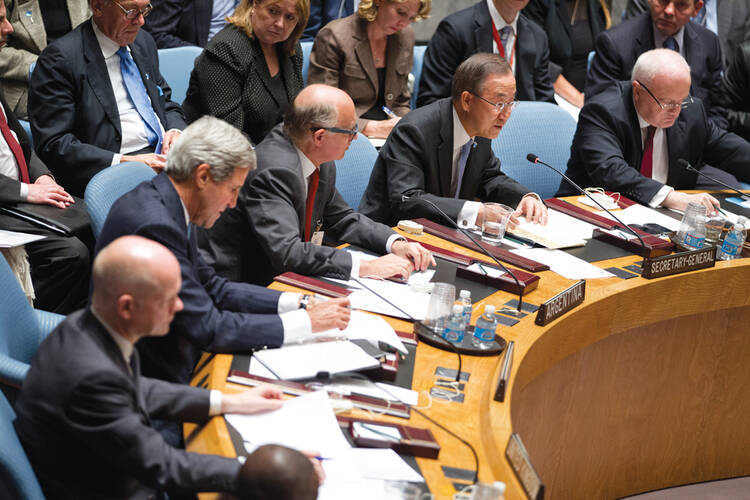U.N. Week, otherwise known as the U.N. 68th General Assembly, ended on Sept. 30 in New York with some notable successes. Iran and the United States in speeches and statements issued by their respective presidents strongly outlined their geopolitical differences. But the two leaders managed to close some diplomatic distance, which offered hope for a more meaningful rapprochement in the near future, including a deal that might finally settle the controversy over Iran’s suspected nuclear weapons development and end Iran’s diplomatic and economic isolation.
A deal to track down and remove chemical weapons from the civil war in Syria was also concluded with the endorsement of the U.N. Security Council on Sept. 27. It remains to be seen if the chemical weapons agreement can lead to an opening to bring a ceasefire and a possible resolution to a two-year old conflict that has sent millions into flight and killed more than 110,000 people.
And among other discussions, presentations and diplomatic initiatives, the United States signed on, despite a vehement protest from an indignant National Rifle Association, to the U.N. Arms Trade Treaty. That international effort aims to finally create a regulatory regime aimed at containing the deadly, destabilizing global small-arms and conventional weapons trade. The United States joined 17 other signatory states on Sept. 25, pushing the total number of the treaty’s signatories to more than half of the U.N.’s member states.
These developments and more during the 68th General Assembly can be seen as positive steps toward a more peaceful world. But the continuing violence in Syria and the greeting received by Iranian President Hassan Rouhani when he returned home—his car was pelted with eggs by Islamic hardliners after a close call with a handshake from President Obama in New York—suggest how precarious even small steps to peace can be. The assembly ended just shy of the anniversary on Oct. 4 of Pope Paul VI’s 1965 address to the United Nations. Forty-eight years ago, Pope Paul had urged the members of the U.N.’s general assembly to “go forward.”
“The edifice which you have constructed must never collapse,” the pope had said. “It must be continually perfected and adapted to the needs [of history].” He implored the member representatives to assume the United Nations’ historic responsibility to preserve the global peace. “It is enough to remember that the blood of millions of men, numberless and unprecedented sufferings, useless slaughter and frightful ruin are the sanction of the covenant which unites you, in a solemn pledge which must change the future history of the world: No more war, war never again,” he said. “It is peace, peace which must guide the destinies of peoples and of all mankind.”
Other small “peaces” achieved during a week of negotiations and presentations included the highlighting of progress on the Millennium Development Goals to halve extreme world poverty by 2015. This year the needs of disabled people were added to the complex of issues identified in the M.D.G.’s. U.N. Secretary-General Ban Ki-moon said 80 percent of the world’s persons with disabilities were of working age and the same percentage of disabled people lived in developing countries. He said too many of them lived in poverty, suffered from social exclusion and lacked access to education, employment and health care as well as social and legal support systems.








